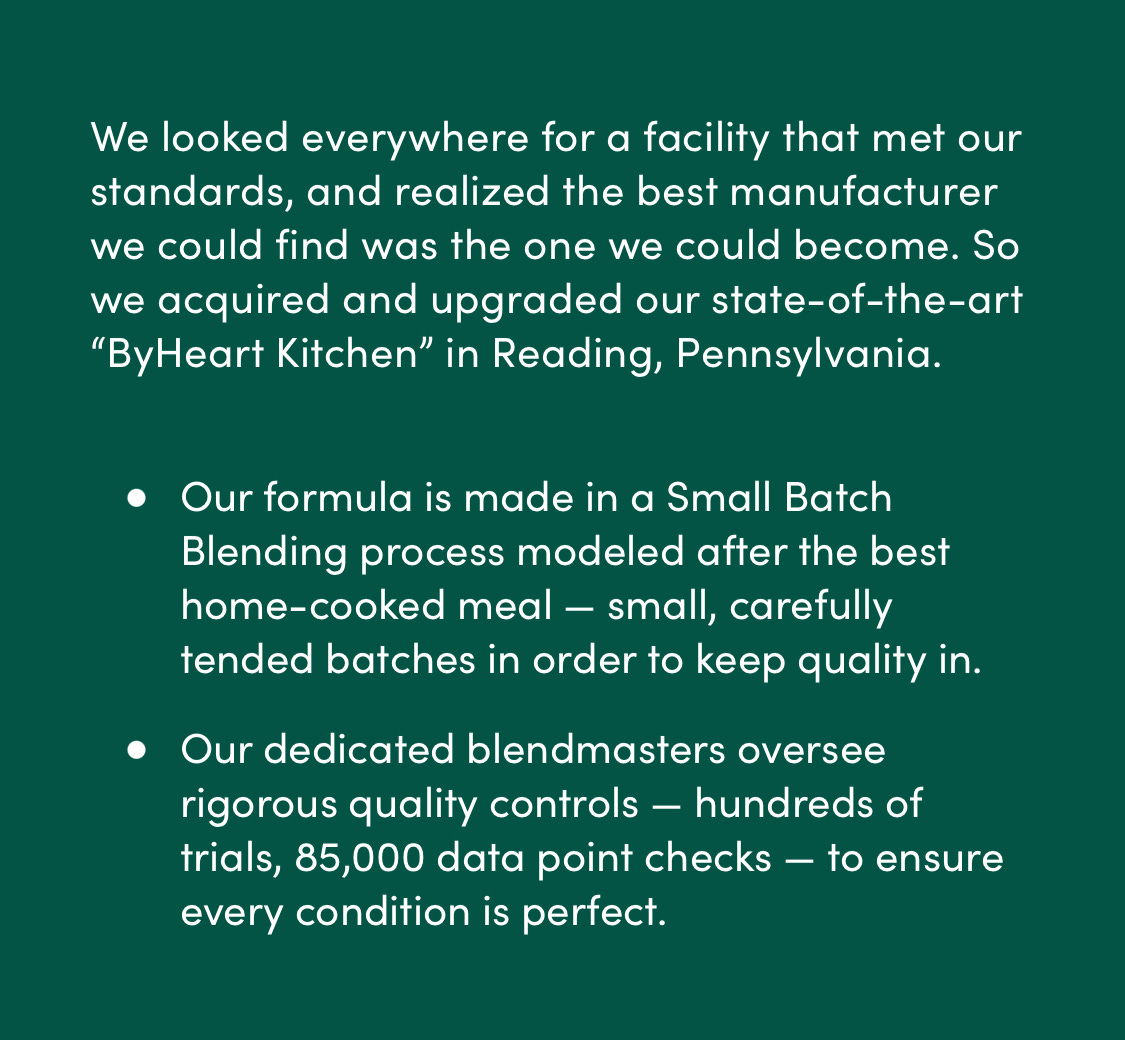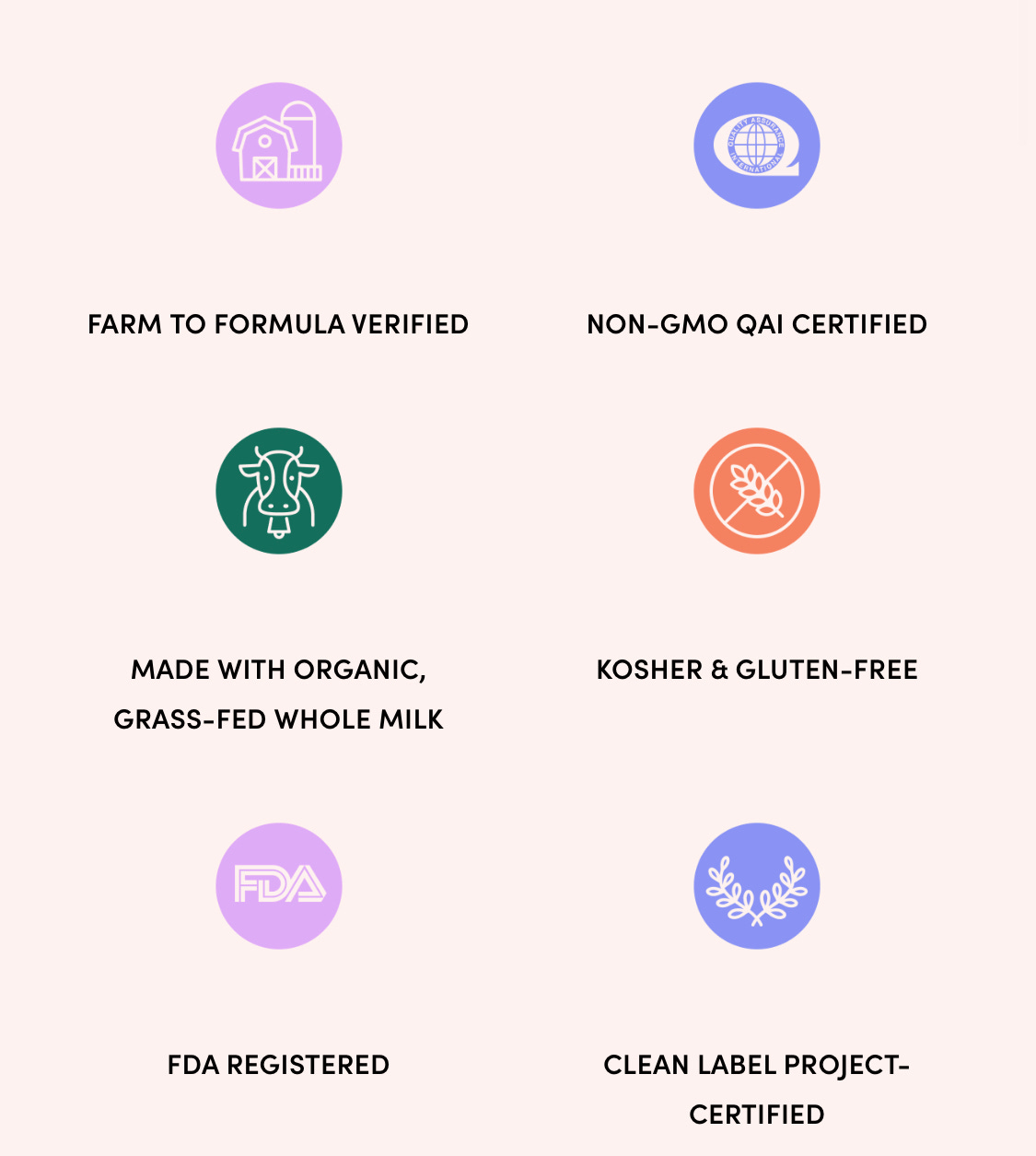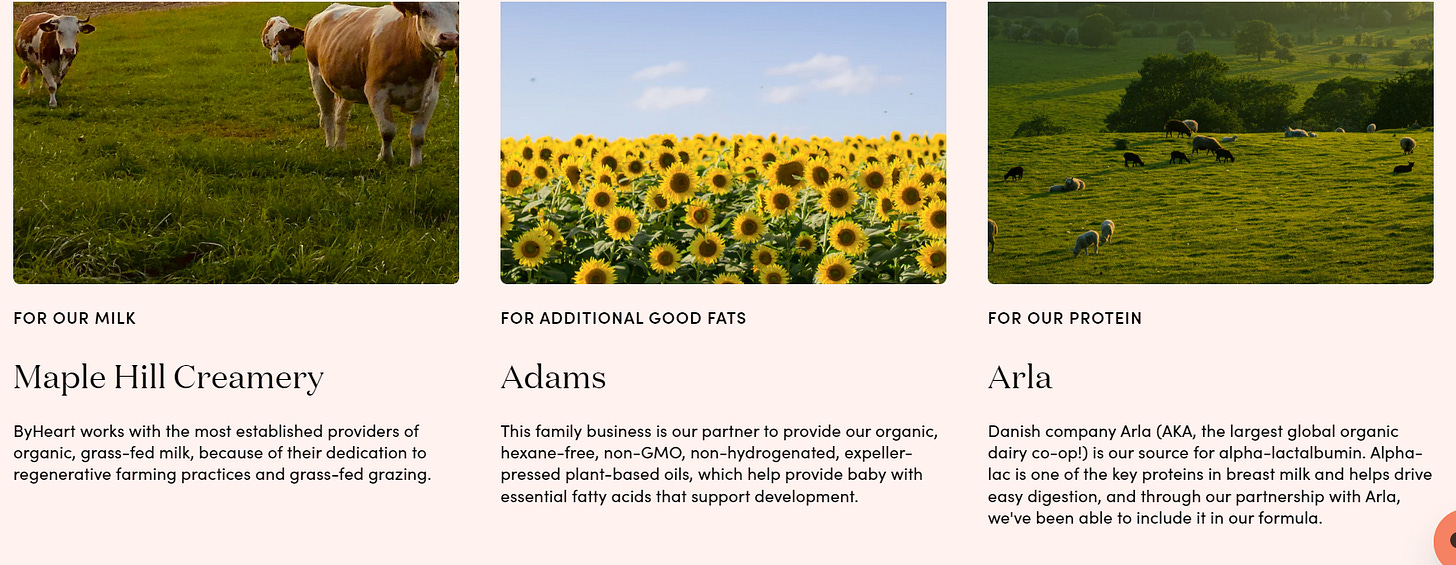Yes, we're still recalling formula
The ByHeart recall, and the problem with "clean eating" rhetoric in processed foods
Earlier this month (December 11), I got this notice about yet another formula recall:
ByHeart, a next-generation baby nutrition company, announced today that, out of an abundance of caution, it has chosen to voluntarily recall five batches of ByHeart Whole Nutrition Infant Formula due to the potential for cross-contamination with Cronobacter sakazakii. No distributed ByHeart product has tested positive for the bacteria.
A couple things to note before we begin: This is a voluntary recall initiated by the company, due to the results of internal testing, in which product was pulled before it ever hit the marketplace. All in all, best case scenario when we’re talking about a recall, especially in something like infant formula.
But for those who don't regularly buy baby formula (or, as is still too often case for me, attempt to buy formula), this is yet another exhausting episode in the long-running saga that is the 2022 Total Recall of infant formula. It turned out that the nationwide recall of Similac powder formula back in February was just the beginning. Since then, there have been subsequent recalls that received less press, but have prolonged the formula shortage.
Shelves are still empty because people need formula; babies under a year old truly can't have any other option besides breastmilk (it only took the Senate 11 months from the initial announcement of the Abbott recall to pass a bill that protects women’s rights to pump at work).
But shelves are also empty because, for some reason, we keep finding pathogens like Cronobacter sakazakii in infant formula. This latest recall may give some interesting clues as to why.
This recall caught my attention because it happened to the kind of formula company (or rather, “next generation baby nutrition company”) that people buy from if they think that “processed foods” are the problem, and “clean eating” is the solution.
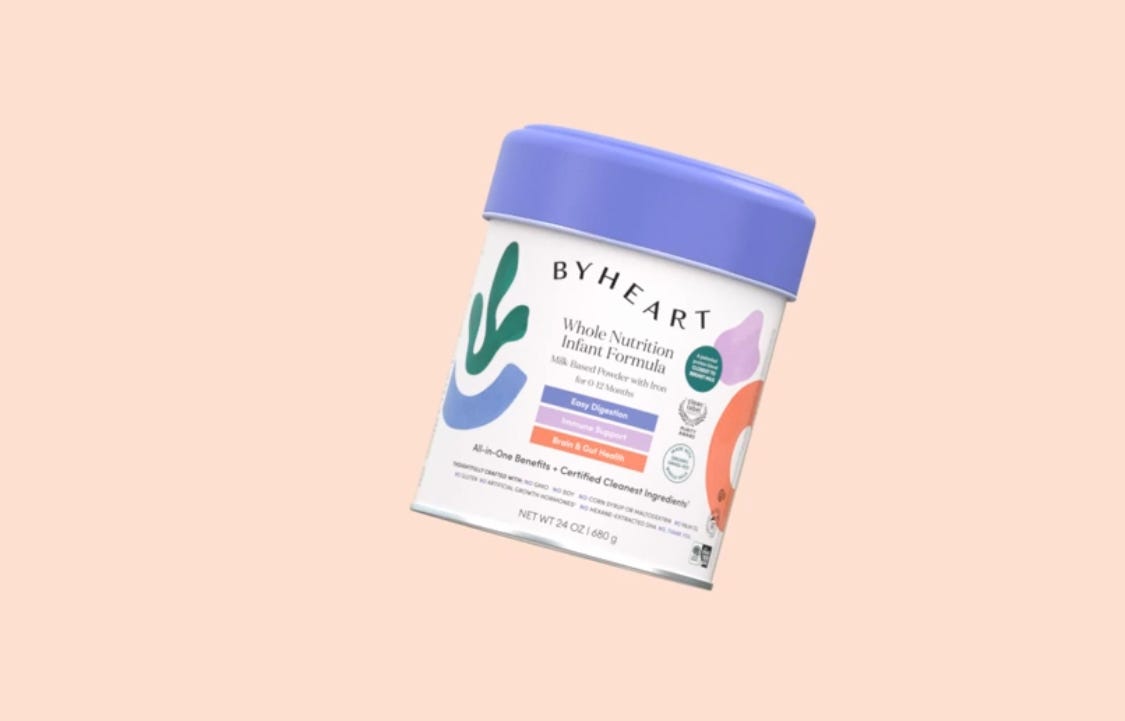
The clean eating trend has bothered me for several years, and I’m increasingly convinced that it’s my generation’s version of “pure food.” The obsession with cleanliness has everything to do with all the vague associations that got attached to “pure” food in the early twentieth century and almost nothing to do with the processes and procedures that are often involved in ensuring your food is free of contaminants or adulterants. Sadly, it’s not nearly as catchy to base your movement on “quality assurance.”

Do I ever “got questions” for this. What, exactly, are parents choosing between when the choices are “science backed” or “clean”??? Are people making formula at home?? Are we calling breastmilk “clean” in this scenario? (Lol)
My rage aside, what’s interesting about this (false) dichotomy is that the movement for pure food was, for all the vagueness, the cleanliness-is-next-to-godliness vibes, nevertheless indelibly associated with science. The primary image of the pure food crusader in the nineteenth century was not a homesteader railing against “toxins,” (though those groups were an important part of the movement) but a chemist assigned to confirm the purity of items like sugar, milk, and bread.
But if I’m being honest, when I look at ByHeart’s website - I get the appeal. Their ad copy looks like the sort of thing that would show up on my Instagram if I did a better job of telling the algorithm I had a baby. Their website describes their product as “the mother of all formulas,” with “clinically-proven, next-to-breast milk benefits and certified cleanest ingredients.”
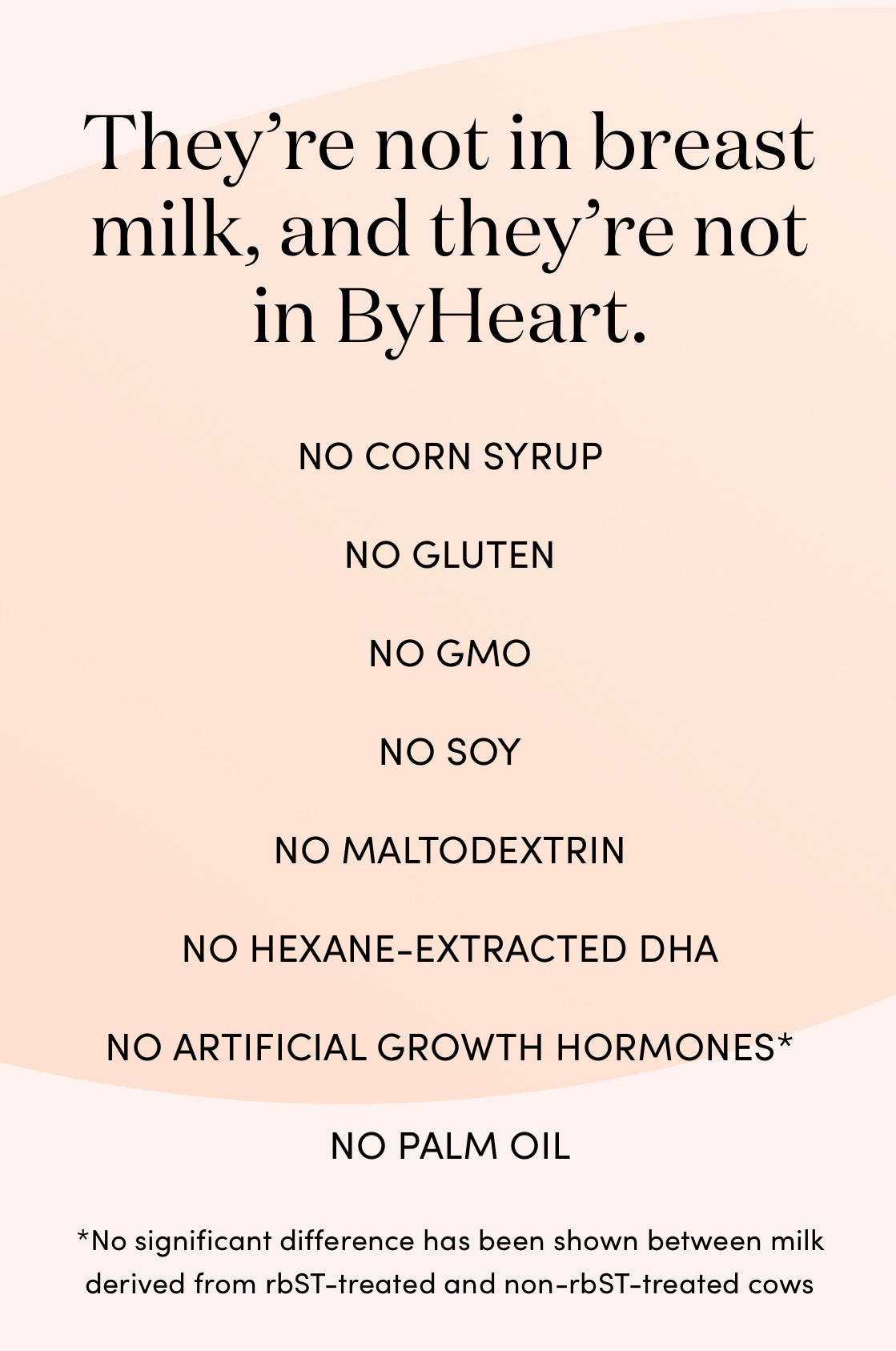
They use an all-aluminum can that’s easily recyclable; they avoid corn syrups and other fillers that, admittedly, I don’t particularly like to see on the side of my formula can anyway; they tell you exactly who their suppliers are, and how their process works.

Or do they? From the rest of the FDA announcement:
ByHeart owns its entire manufacturing supply chain with the exception of final canning, which is conducted by a reputable third-party packager. ByHeart is taking this precautionary measure because one test sample collected from the third-party packaging facility tested positive for Cronobacter sakazakii. All product packaged that day, and the first production on the next day, was isolated for destruction and not distributed. Out of an abundance of caution, we are now recalling all product produced during the entire production run.
I’m not at all claiming that ByHeart was being deceptive in not disclosing the third party canner on the otherwise-detailed description of their “farm to formula” process on their website. I’m just pointing out that companies like ByHeart currently have no reason to bother explaining the practicalities of producing a processed product like infant formula to an audience that is much more interested in hearing about their “small-batch” process “modeled after the best home-cooked meal,” in which “dedicated blendmasters oversee rigorous quality controls” (aha! there’s the quality assurance bit).

It’s not only inconvenient, it’s almost irrelevant to explain that canning equipment is expensive, all small processors farm out canning,1 when you're speaking to an audience who prefers that you call your manufacturing plant the “ByHeart Kitchen."2
I want to emphasize again that none of this is deceptive, and none of it is particularly unique to ByHeart, but it is extremely annoying. It’s marketing disguised as informational labeling. It’s knowing that consumers want to know the product is “certified clean” and then obtaining a “clean label” certification that meets those consumer expectations. It’s listing your product as “FDA Registered” so you can trade on the FDA logo and reputation even though, as you might expect, there is no premarket approval for baby formula, and the “FDA Registered” label for food means basically nothing. Meanwhile, I notice that the Kosher claim *doesn’t* use the official Kosher symbol. However, the QAI Certified logo is a fascinating choice. It is legit, but it almost doesn’t matter, because it sure does look official, doesn’t it?
It’s all a mixture of signal and noise, information and hype, in a way that makes it impossible to distinguish which parts matter and which parts don’t.
But to return to the original point - what does this tell us about the ongoing formula recalls contributing to the current shortage? The fact that this is no longer confined to Big Formula means that we might need to take a closer look at certain steps of the process - not because canners are especially irresponsible, but because there must be some new or unforeseen risk that isn’t being accounted for in current quality assurance protocols. In other words, it may be more important to check on the SSOPs or the HACCP plan3 than to seek out ever more "clean" and "natural” formula production.
Fundamentally, the thing that annoys me is that ByHeart is promising the peace of mind of a “pure” “clean” “unprocessed” product, in a product that very much requires a lot of processing to produce. And it works, because this is something consumers have told companies that they want. But that promise is always going to let down consumers who don’t recognize that a key part of processing is the imposition of something called process control, which is meant to reduce risks (like contamination) as much as possible. It’s always going to disappoint consumers who still, almost a hundred years after the pure food movement, want to be told that modern food production can be done without the evils of “processing.”
I want to like ByHeart’s “let us show you our process” approach to transparency, but the backtracking required to explain that actually, no, everything isn’t made in our “By Heart Kitchen” in order to maintain consumer confidence undermines the whole story. It’s a strategy borne of the push for traceability, but it’s neatly cropped and filtered to show only the parts that consumers want to see.
As ByHeart’s website promises: “baby, you can have it all." Which now includes Cronobacter, apparently.
This is perhaps known best in the craft beer industry, where acquisition of one’s own canning lines meant that your town’s small brewer had, in fact, Made It.
There's something here about how even the production process gets gendered and associated with domestic spaces that I'll leave for someone else to unpack.
Sanitation Standard Operating Procedures and Hazard Analysis and Critical Control Points, respectively. HACCP is used independent of regulatory oversight but is also used by regulators. FDA regulated products now must use HARPC (Hazard Analysis and Risk Based Preventive Controls), which is functionally a rebranding of HACCP that comes from the Food Safety Modernization Act (FSMA) of 2011. Is it any wonder that consumers prefer terms like “clean” and “pure” in this sea of acronyms?


